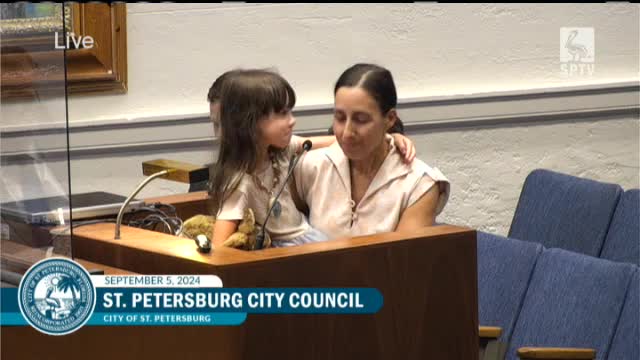City Council Debates Bold Changes for Arts District Development
September 05, 2024 | St. Petersburg, Pinellas County, Florida
This article was created by AI summarizing key points discussed. AI makes mistakes, so for full details and context, please refer to the video of the full meeting. Please report any errors so we can fix them. Report an error »

During a recent city council meeting, community members voiced concerns and suggestions regarding urban planning and zoning changes in St. Petersburg, particularly focusing on parking, food truck regulations, and workforce housing.
One speaker highlighted the dangers posed by parking lots lacking sidewalks, emphasizing the need for more trees and pedestrian-friendly spaces. They argued that reducing parking could encourage greater use of public transit options like the Sunrunner, especially in transit-oriented zones. The speaker urged the council to prioritize the needs of citizens over vehicles, advocating for a more walkable and bike-friendly environment.
Joseph First, a local resident, expressed frustration over significant changes to zoning regulations that had been discussed for years. He stressed the importance of balancing the needs of the arts community with commercial uses, warning that strict requirements for ground-floor usage could hinder the development of bars and restaurants that support local artists. He also raised concerns about the clarity of environmental regulations related to industrial uses in new developments.
Mark Ailing, a business owner in the Warehouse Arts District, praised the city's progressive approach to zoning but echoed concerns about food truck regulations. He argued that requiring food trucks to relocate during events would disrupt operations and suggested allowing them to remain on-site for the duration of their permits.
Council members discussed proposed changes to workforce housing requirements, with some advocating for increasing the percentage of affordable units from 5% to 10%. They also considered adjusting parking mandates to give property owners more flexibility in determining their parking needs, reflecting a growing trend towards car-free living in urban areas.
Overall, the meeting underscored the community's desire for thoughtful urban planning that supports both the arts and sustainable living, while also addressing safety and environmental concerns. The council is expected to continue deliberating these issues in future sessions.
One speaker highlighted the dangers posed by parking lots lacking sidewalks, emphasizing the need for more trees and pedestrian-friendly spaces. They argued that reducing parking could encourage greater use of public transit options like the Sunrunner, especially in transit-oriented zones. The speaker urged the council to prioritize the needs of citizens over vehicles, advocating for a more walkable and bike-friendly environment.
Joseph First, a local resident, expressed frustration over significant changes to zoning regulations that had been discussed for years. He stressed the importance of balancing the needs of the arts community with commercial uses, warning that strict requirements for ground-floor usage could hinder the development of bars and restaurants that support local artists. He also raised concerns about the clarity of environmental regulations related to industrial uses in new developments.
Mark Ailing, a business owner in the Warehouse Arts District, praised the city's progressive approach to zoning but echoed concerns about food truck regulations. He argued that requiring food trucks to relocate during events would disrupt operations and suggested allowing them to remain on-site for the duration of their permits.
Council members discussed proposed changes to workforce housing requirements, with some advocating for increasing the percentage of affordable units from 5% to 10%. They also considered adjusting parking mandates to give property owners more flexibility in determining their parking needs, reflecting a growing trend towards car-free living in urban areas.
Overall, the meeting underscored the community's desire for thoughtful urban planning that supports both the arts and sustainable living, while also addressing safety and environmental concerns. The council is expected to continue deliberating these issues in future sessions.
View full meeting
This article is based on a recent meeting—watch the full video and explore the complete transcript for deeper insights into the discussion.
View full meeting